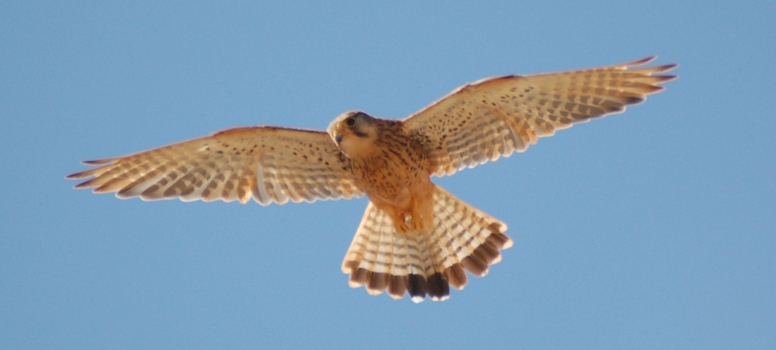Kestrel

The Kestrel or windhover, star of Ken Loach's 1969 film "Kes" is one of our most familiar birds. Hovering, moving on, hovering, wings and tail moving, head staying perfectly still is its classic hunting style. On the lookout for small rodents, the Kestrel is one of our most well-known birds of prey. The attached photograph from Gordon Riddle captures the Kestrel hunting style.
However, all is not well with this hunter. The latest Breeding Bird Survey (BBS) report reveals a significant decline, of 20%, in the Kestrel population between 1995 and 2008, and a further fall of 36% between 2008 and 2009. Kestrel declines between the 1970s and 1990s have been linked to agricultural intensification on farmland and the adverse effect this has had on populations of small mammals, but the reasons for more recent declines are not clear. That is the national position.
Did this decline also happen on Arran? With your help it may be possible to answer this question.
There is information on Kestrel on Arran from 1985. Gordon Riddle, Chairman of the South West Scotland Raptor Study Group, wrote an article that year The Kestrel on Arran, in the Arran Naturalist 9: pages 4-12. In this article Gordon acknowledged the information and help given by local observers Margaret Dunn, John Rhead, Howard Walker and Derrick Warner. In the article he stated "The Kestrel population on Arran is relatively stable occupying a niche mainly on the lower ground round the coastline". But is that still the case twenty five years on?
To get as accurate a picture as possible of the present position of Kestrel on Arran, over this breeding season, please share any Kestrel sightings with me, particularly where you see adults carrying food or young birds on the wing. A comparison of the 1985 records with the present should help to answer the question about whether or not the national decline in Kestrel is reflected in the Arran population.
Finally, to get a captivating insight into the world of the Kestrel let me recommend Gordon Riddle's new book Kestrels for Company to be published by Whittles Publishing. It is based upon almost 40 years' observation of Kestrel in Britain. It should be easy to read combining a mixture of facts with entertaining anecdotes and experiences.